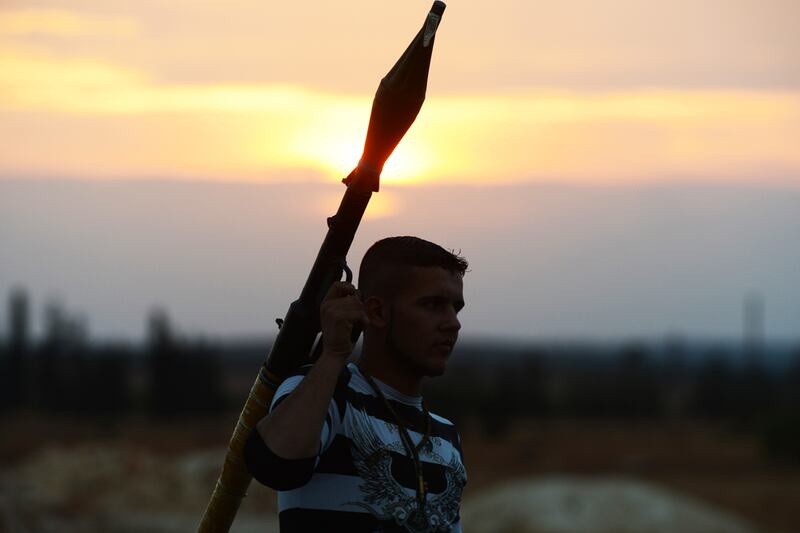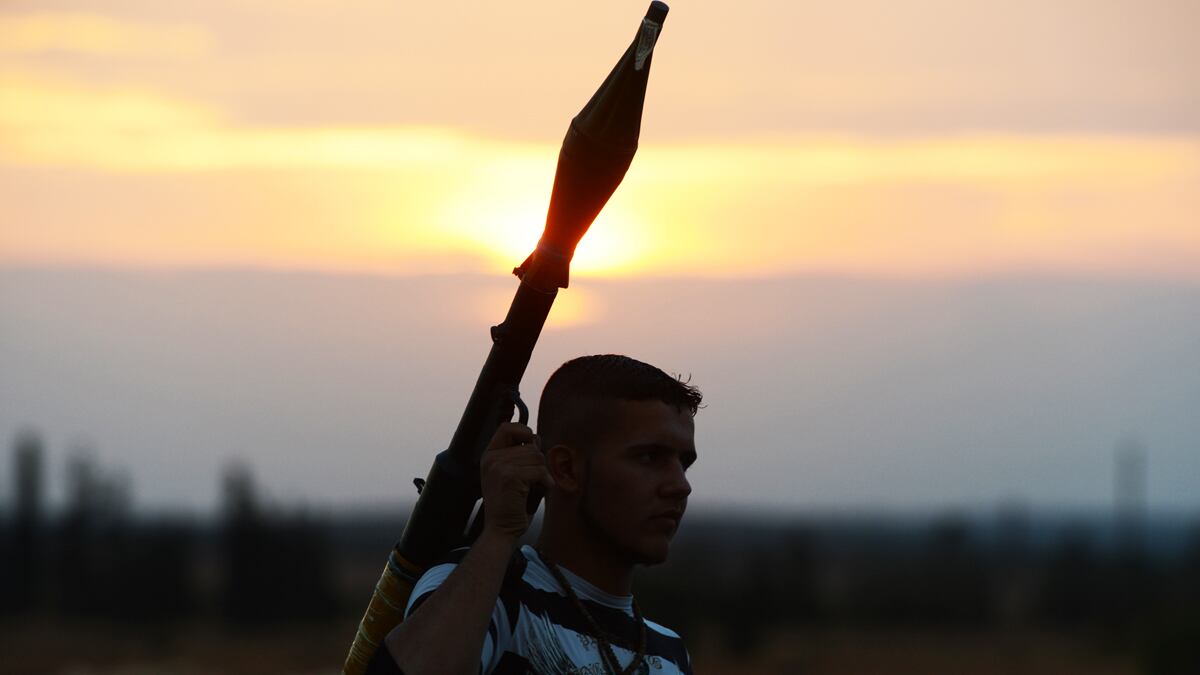When I first met the man I’ll call Mahmoud, he refused to speak with me because he “hates America.” Carrying a conspicuous wad of U.S. dollar bills and surrounded by young Syrian men, Mahmoud caught my eye one evening in the lobby of my Turkish hotel on the border with Syria. Through a series of talks, I slowly discerned that he was from Saudi Arabia, that he had learned English in Canada, and that he was here to “help the Muslims of Syria in their jihad.”
One evening, 29-year-old Mahmoud explained to me that he ferries money, not guns, to the Syrian people. He said that the Free Syrian Army (FSA) can use the funds for humanitarian purposes or for weapons, but he just gives it to the officers and lets them make the decisions. “I’m just a soldier of Allah,” he told me.
It is precisely this powerful combination of steadfast discipline and bottomless pockets that has many Syrians and their Western allies worried about jihadists like Mahmoud. Though comprising only a tiny minority of Syria’s armed opposition, the foreign fighters bring ample combat expertise and ample funds to the war against Syrian President Bashar al-Assad’s regime—and critics fear that they are slowly gaining a disproportionate influence over the FSA.
ADVERTISEMENT
“Syrians have both a deep fear and a deep respect for the foreign fighters,” says a Syrian civilian activist from Aleppo who goes by the nom de guerre of Hassan. “We don’t understand them, but we can’t deny their fighting ability, and that’s what we need right now against Assad’s airplanes,” he says, referencing the ongoing aerial bombardment of the city by government forces.
Indeed, one of the fundamentalist jihadi sects affiliated with the FSA, known as Jabhat Al Nusra, has been credited with securing many of the FSA’s recent advancements in the North, notably a key air force base outside Aleppo last week. As the West continues to hesitate on intervention in Syria, fundamentalist forces from the Persian Gulf and beyond have increasingly filled this void. Foreign fighters from the Gulf states, Libya, Afghanistan, Pakistan, Palestine, and Chechnya—and even a handful of jihadis from the West—have assembled in Syria, bringing foreign funds and the sum of fighting experience from their struggles across the globe.

Mahmoud claimed that he joined “the Syrian jihad” of his own volition, as did a few of his Saudi friends, and that the funding came from generous Saudi religious donors, not the official Saudi government.
“Our leaders are cowards, they’re just letting that Shia bastard [Assad] kill the Syrian [Sunni] Muslims,” he fumed. “That’s why I’m here, so they know that the people of Saudi are with them, even if our government isn’t.”
Mahmoud’s claims reflect a growing fear that Gulf governments have been communicating to their Western allies in recent weeks: that without a decisive intervention in Syria, the region’s rampant sectarianism could escalate into a popular jihad. In early October, Saudi and Qatari officials noted an increase in young foreign fighters departing for Syria, as well as an increase in private fundraising for the rebels’ cause.
Though both countries have given significant amounts of financial support and even small arms to the Syrian opposition, they are criticized domestically for heeding the West’s demands to refrain from providing more sophisticated weaponry to the rebels. For their part, both Saudi Arabia and Qatar have warned the West of the potential for a widespread Sunni jihad if the civilian carnage in Syria continues unabated and without foreign intervention.
Last week, the International Crisis Group released its report “Tentative Jihad: Syria’s Fundamentalist Opposition,” which analyzed much of the speculation around the issue of fundamentalism in the Syrian armed resistance. The report examined the roots of the fundamentalist emergence within the opposition and concluded that a coordinated, multilateral transition to a political solution is necessary to curb this trend.
“The West’s reluctance to act, coupled with the early willingness of private, wealthy, and religiously conservative Gulf Arabs to provide funds, bolstered both the Salafi’s coffers and their narrative, in which Europe and the U.S. figure as passive accomplices in the regime’s crimes,” says the report.
“Much of the debate has focused on whether to arm the opposition—and, if so, by whom and with what, but that’s not the main issue,” said the ICG’s Middle East and North Africa director, Robert Malley, in the report’s press release. “It is, rather, to rationalize and coordinate support to the opposition and help the emergence of a more structured, representative, and effective interlocutor in what must be a negotiated outcome.”
Hassan, the Syrian civilian activist, nostalgically recalls the early days of the nonviolent protests in Aleppo and his attempts to organize his traditional, but not particularly religious, working-class community to join the civil resistance movement.
“They were skeptical because they saw what Assad did to the peaceful protesters in Homs,” he explained. When the siege of Aleppo began, his neighbors were eventually forced to take up arms against the regime or flee the city.
“When I returned and saw that everyone had weapons, I knew they were from Jabhat al Nusra,” Hassan says. “But what were they supposed to do with Assad dropping barrel bombs into Aleppo? They needed help, and Jabhat Al Nusra was there.”
In the absence of a Western-enforced no-fly zone, Syrians like Hassan fear for what the future of the conflict holds for civilians but insist on the resilience of the Syrian people. “If you look back in history, Syria has always been a country of many races and religions,” Hassan says. “Churches and mosques share walls so I’m keeping my faith in our Syria.”





